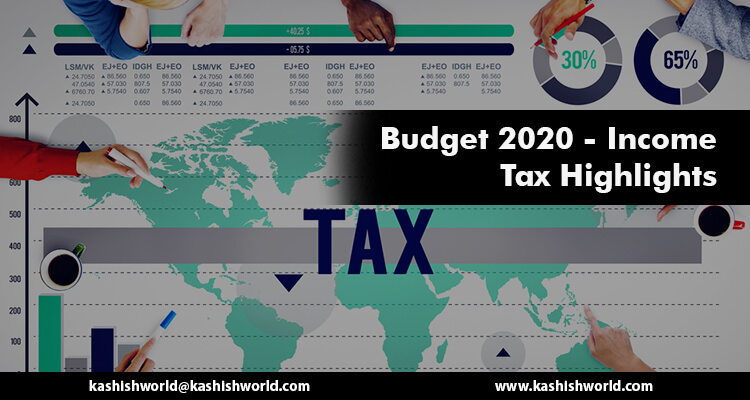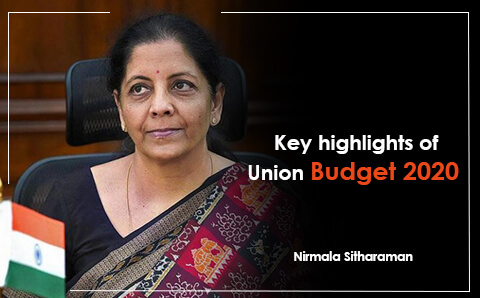
The Finance Minister of India, Nirmala Sitharaman, introduced various proposals corresponding to the personal tax regime in the Union Budget 2020 on 1st February 2020 at the Parliament. The budget includes the following aspects:

Determining Residential Status for a few Categories of Individuals
Budget 2020 has proposed to introduce several amendments as follows corresponding to determining the residential status for a few categories of individuals:
A citizen of India shall be deemed to be a resident of India in any financial only in the scenario if the individual is not liable to tax in any other country across the globe.
According to the existing provisions, a citizen of India or a person of Indian origin, who is outside the country and comes to India in any financial year, would be treated as a resident of India, only if the individual stays here for 182 days or more. The proposed amendment in the budget 2020 provides for such an individual to be a resident of India, only in either of the two scenarios mentioned below:
- During the financial year, the individual’s stay in India is 182 days or more
- In the current financial year, the individual’s stay in India is 120 days or more, and in the previous four financial years, the individual’s stay is 365 days or more.
Determining the residential status for other categories of individuals has the same basic conditions.
New Income Tax Regime (Optional)
Although there is no change in the already existing income-tax slab rates for people, a new income tax regime has been put forward under which individuals foregoing exemptions and deductions would be taxed at pretty lower tax rates. The new income tax regime will come into effect from the financial year 2020-2021.
The exemptions and deductions that would require to be forgone are as follows:
Inter alia exemptions and deductions widely claimed by individuals, such as House Rent Allowance (HRA), Leave Travel Concession (LTA), standard deduction, deductions under Section 80C, deduction concerning self-occupied house property, set-off of loss from house property against any other source of income, and so on.
New Income Tax Slabs are as follows:
- Up to INR 2, 50,000 – Exempted
- INR 2, 50,001 to INR 5, 00,000 – 5%
- INR 5, 00,001 to INR 7, 50,000 – 10% (Earlier – 20%)
- INR 7, 50,000 to INR 10, 00,000 – 15% (Earlier – 20%)
- INR 10, 00,001 to INR 12, 50,000 – 20% (Earlier – 30%)
- INR 12, 50,000 to INR 15, 00,000 – 25% (Earlier – 30%)
- No change in tax rates above INR 15, 00,001 (Earlier and Now – 30%)
According to the tax experts, the individuals need to check if they can extract greater benefits from the new income tax rates. It completely depends from one case to another. As the new income tax rates are optional, the individuals can continue paying at the older rates as well. Also, it is essential to make a point of the fact that individuals with business income can’t keep switching between the new and old income tax rates; however, others can do so.
At present, business firms and companies are required to pay the Dividend Distribution Tax (DDT) on the dividend paid to their shareholders at the rate of 15% along with applicable surcharge and cess. It is in addition to the tax, which the companies pay on their profits. As per the new income tax rules, the dividend will be taxed only in the hands of the recipients at their applicable rates. Previously, dividend income above INR 10, 00,000, was taxable at the applicable rate in the hands of the recipients.
For promoting affordable housing, the finance minister has extended the date by a year to 31st March 2021 for availing additional tax benefits on the purchase of new houses (up to INR 45, 00,000). House owners, who have taken loans for purchasing homes up to INR 45, 00,000, can now claim an additional tax deduction of INR 1, 50,000. It will be in addition to the INR 2, 00,000 deduction that is available to those house owners who bought affordable housing on loans borrowed up to 31st March 2020.
High earners will have to pay tax on employers’ contributions according to National Pension System (NPS), Employees’ Provident Fund (EPF), and superannuation fund only if it goes beyond the cumulative upper ceiling of INR 7, 50,000 per year.
Apart from the income tax on the employer’s contribution, if in case the cumulative amount exceeds INR 7, 50,000, then by way of interest or dividend, annual accretion shall also be taxable.

